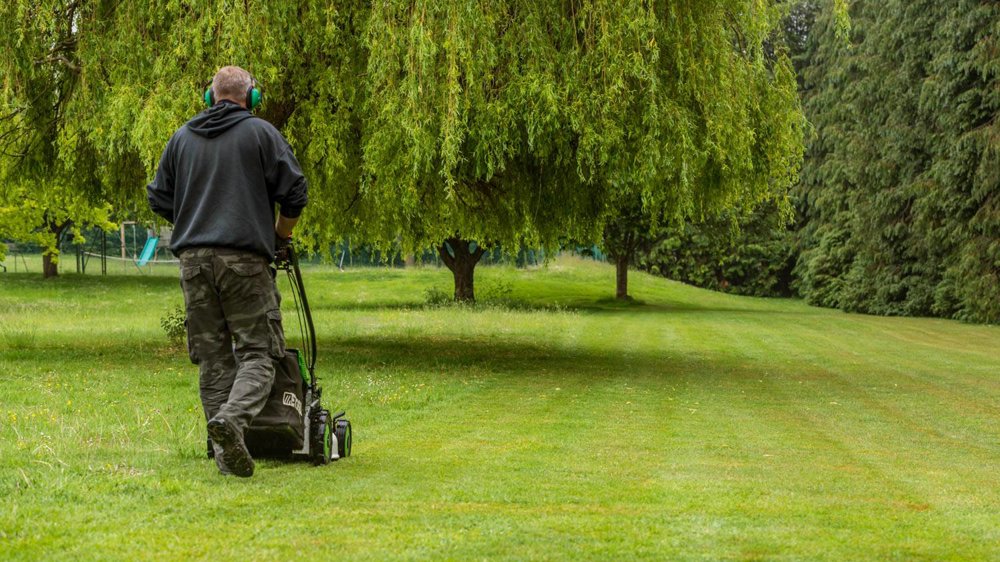Living the life of a landscaper – the physical and mental considerations
12 May 2023 Small Business Advice
Landscaping work can be incredibly rewarding. Creating and maintaining attractive, functional spaces for people to enjoy and experience the benefits of time spent outside can be hugely satisfying. But it can be a physically demanding job and due to it often being a one-man job, it can lead to some long and lonely days of work.
Here we explore the subject and hopefully provide some useful guidance on how to deal with both the physical and mental effects of a job in landscaping.
Physical
There are numerous advantages to an outdoor active job, compared to a sedentary desk job. With many advantages for your health and overall wellness. Being physically active can help you stay in shape and reduce the risk of health issues like heart disease, diabetes, and obesity. Fresh air, light exposure and getting regular exercise can help to improve sleep quality by regulating your body clock and can be very beneficial for mental health, helping to reduce stress and boost your mood.
Active jobs can help build strong bones and muscles, improve balance and coordination, and increase energy levels. But it's important to be careful and be aware of potential hazards associated with active work – like repetitive strain injuries, heat-related illnesses, or falls – and make sure you take the necessary precautions.


Landscaping work includes lifting and carrying, stretching, bending over, twisting, and pulling and pushing heavy loads. Hence, it’s considered a high-risk industry, with the US National Library of Medicine, the world's largest library of health information, finding a high proportion of injuries frequently reported among landscape workers.
The most prevalent musculoskeletal problems reported were, in order, in the shoulders, neck, wrist/hand and lower back. With almost half reporting symptoms in more than one region.
The most significant risk factor was awkward posture such as squatting, kneeling, and bending for long periods of time, forceful exertion, and repetitive motion caused by the likes of sweeping, raking, cleaning up leaves, watering plants, clearing drains, and trimming hedges and trees. When you factor in the 40-plus hour weeks you put in and how you may need to perform the same tasks repeatedly or for numerous clients week in, week out, it’s clear to see how a repetitive strain injury could become a problem.
The physical exertion of the job can all add up. Take pushing a mower, for example; that task alone could burn up to 500 calories an hour (the same as playing tennis!).
So, what’s the solution?
Posture
Understand and respect your limits and observe proper body mechanics, posture and lifting techniques to minimise the risk of repetitive strain injury and the overuse of joints, ligaments and muscles. Take regular breaks to rest and stretch. Good posture for the tasks at hand will help enormously by reducing strain on muscles, joints, and ligaments. Sitting up straight on a ride-on mower for example, is a simple adjustment that can make a big difference over time.
Injury from incorrect or unsafe use of equipment
To minimise the risk of injury, it’s important to wear proper protective gear and follow safety instructions for all equipment used. Choose the right tools for each task and follow correct procedures for operation - study the machine’s operation manual or invest in training.
Prevent fatigue
Proper hydration and adequate calorie consumption is essential to maintain concentration. Staying energised throughout the day can prevent you getting distracted around dangerous equipment or getting tunnel vision on the task at hand which can lead to accidents. Regular breaks not only provide respite for your body but mind too.
Additional advice:
- Always stay aware. Take steps to stay alert. Focus on both the job and what’s going on around you.
- Keep tools sharp. Dull blades require more force to get the job done, increasing risk for repetitive stress injuries and cuts.
- Know your equipment. Blowers, mowers and other power tools can cause severe injuries if used incorrectly. Make sure to read the manual and learn safe operating techniques for all power tools.
- Power ALL the way down. Ensure all blades have stopped moving completely and tools are de-energized before attempting maintenance on equipment.
Exposure to heat and sun
As with all outdoor work, the environmental hazards must be considered and respected. Long hours in the sun can lead to heat stress, dehydration, sunburn, and even heat exhaustion. The advice here is simple: where you can, avoid working during the hottest times of the day, rehydrate well, wear loose, light coloured clothing, and apply sunscreen regularly.
And because it’s a year-round job, there’s the other extreme of periods working in unrelenting conditions – rain and the impact of torrents of water and water logging, and the cold, both causing a different set of problems. Working in these conditions is dirty, difficult and exhausting and it’s important to dress for the weather – as the saying goes, there’s no such thing as bad weather, just inappropriate clothing, so wrap up well.
Mental health and wellbeing
A minimum of one in six people experience mental health issues every year, though it often goes unreported. In the UK, it was found that men between 40-49 years old are at the biggest risk of experiencing a mental health crisis – a demographic enormously represented in the landscaping sector – with one in six workers experiencing depression, anxiety or problems relating to stress over the course of their lifetimes.

Stress in the workplace is common across industries, and, unfortunately, landscaping is no exception. It’s important to be on top of workplace stress concerns given the nature of the work — manual labour, lone working, outdoor working conditions and demanding projects can all impact physical and mental wellbeing.
The evidence that all 'green is good for your health' that we attribute to time in the outdoors for recreational reasons, probably does not translate if you work outdoors. Issues around work worries, job security and unsocial or uncomfortable working conditions could override many of the benefits of working outside and in nature.
The frequent causes of work-related stress, depression or anxiety are, typically: workload pressures, people pressures, financial concerns, tight deadlines or perceived time shortages, too much responsibility and a lack of support. With feelings of anxiety, self-doubt, isolation, exhaustion and annoyance potentially affecting landscapers, this may be no surprise seeing as the industry is predominantly made up of self-employed workers and small businesses.
Managing stress requires a combination of physical wellbeing, good project management and mental health discussion. The following tips will help you handle stress in the landscaping industry:
Handling finances
Finances are of course a concern for the vast majority of people, but when you’re running your own business, these worries are often even more prevalent. Managing your finances well day-to-day helps take some of the stress out of this part of your business; if you’re well aware of your financial position at the end of each month, you’ll be able to clearly see what your expenses are and any unnecessary outputs, and you can act accordingly. Building up a rainy day contingency fund whenever possible also helps take some of the worry off, as you’ll have the security of knowing you can weather the occasional difficult period.
Maintaining a balanced life
It’s all too easy to let work consume your life, but remembering to take time for yourself is incredibly important. Getting enough sleep, eating healthily and spending quality time doing the things you enjoy away from work will help your mental health immensely, and help you to live a balanced life.
Use the off-season to make positive changes and be prepared
In the landscaping world, the months throughout spring and summer are so busy that you have little time to spare. When you get the time to take a breather in the off-season, you should use some of that time to prepare for the busy period: whether you’re making a marketing plan or streamlining your method of invoicing, you can make some changes that you’ll thank yourself for come spring.
Make connections in person and online
Many landscapers work long hours alone; it’s only natural that sometimes you may feel lonely in this profession. You will find you’re not alone in your experience, and many others are eager to build relationships with like-minded individuals. You may find someone locally to connect with, but if not, there are several communities online created to help tackle issues in the profession and provide a platform for sharing expertise. One example is Lawncare Legends, an online forum set up by John Ryan, a self-employed lawn care contractor, who’d noticed just how much mental health issues impacted the daily lives of landscapers. This is a space specifically for landscapers and encourages members to openly talk about their struggles and help one another, it provides an area to showcase work, share knowledge and support one another.
Ask for help
We know it’s not always easy to open up about what’s troubling us, but don’t be afraid to ask for help when you’re finding things tough. Whether that’s by speaking to family and friends or contacting a more professional outlet, like a mental health support charity or your doctor, putting your mental health first is vital for your wellbeing.
Living the life of a landscaper
Landscaping work can be tough, but it’s also immensely rewarding. We know that you’re working hard to run your business, and though at times it can be trying, most wouldn’t want to be doing anything else!
That being said, your health should always be your first priority – we hope you take all the necessary steps to look after yourself. At Kawasaki Engines, we aim to offer tips and advice that will hopefully make running your business easier, allowing you to enjoy a healthier work-life balance.
You may be interested in
-
How to attract employees during a labour shortage in the landscaping industry

-
How to avoid business owner burnout

-
Social media post ideas for your landscaping business

-
How to take great photos and video of your work for your landscaping business

-
Essential tools for landscaping businesses

-
Small business marketing for landscapers: your 1 year marketing plan







